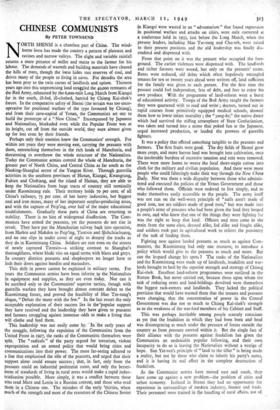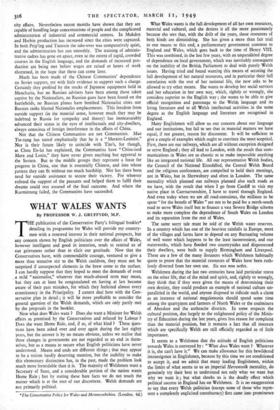CHINESE COMMUNISTS
By PETER TOWNSEND
NORTH SHENSI is a cheerless part of China . The wind- borne loess has made the country a pattern of plateaux and ravines and narrow valleys. The slight and variable rainfall returns a mere pittance of millet and maize to the farmer for his labour. The demands of warmth and building materials have cleared the hills of trees, though the loess hides vast reserves of coal, and drives many of the people to living in caves. For decades the area has been prey to the twin curses of landlords and opium. Thirteen years ago into this unpromising land straggled the 40,000 remnants of the Red Army, exhausted by the 6,000-mile Long March from Kiangsi far in the south, ill-fed, ill-clothed, harried by Chiang Kai-shek's forces. In the comparative safety of Shensi (the terrain was too unco- operative for positional warfare of the type favoured by Chiang), and from their cave-capital of Yenan, the Communists set out to build the prototype of a " New China." Encompassed by Japanese and Nationalists, blockaded even while the Popular Front was at its height, cut off from the outside world, they were almost given up for lost even ,by their friends.
Perhaps only their enemies knew the Communists' strength. For within ten years they were moving east, carrying the peasants with them, entrenching themselves in the rich lands of Manchuria, and threatening to overthrow the whole structure of the Nationalists. Today the Communist armies control the whole of Manchuria, the greater part of North China, and Central China as far south as the Nanking-Shanghai sector of the Yangtze River. Through guerrilla activities in the southern provinces of Hunan, Kiangsi, Kwangtung, Fukien and Chekiang, and the island of Hainan, they are able to keep the Nationalists from huge tracts of country still nominally under Kuomintang rule. Their territory holds 70 per cent. of all China's railways, 75 per cent. of her heavy industries, her biggest coal and iron mines, many of her important surplus producing areas, and with the capture of Peip'ing, over half of the major educational establishments. Gradually these parts of China are returning to stability. There is no hint of widespread disaffection. The Com- munists have armed the peasants, yet the peasants do not rise in revolt. They have put the Manchurian railway back into operation, from Harbin and Mukden to Peip'ing, Tientsin and Shihchiachuang, and no one slips in under cover of night to destroy the tracks as they do in Kuomintang China. Soldiers are rare even on the streets of newly captured Tientsin—a striking contrast to Shanghai's thoroughfares, where khaki vies on equal terms with blues and greys. In country districts peasants and shopkeepers no longer have to lock their doors against bandits and marauders.
This shift in power cannot be explained in military terms. For years the Communist armies have been inferior to the Nationalists in equipment and supplies, as they are even today. Nor can it be ascribed only to the Communists' superior tactics, though with guerrilla warfare they have brought almost constant defeat to the Kuomintang forces, and proved the feasibility of Mao Tze-tung's slogan, "Defeat the many with the few." In the last resort the only acceptable explanation of their success lies in the°popular support they have received and the leadership they have given to peasants and farmers struggling against immense odds to make a living that will clothe and feed them.
This leadership was not easily come by. " In the early years of the struggle, following the expulsion of the Communists from the United Front in 1927, the ranks of the Communists themselves were split. The " radicals " of the party argued for terrorism, violent expropriation and an armed policy that would bring cities and communications into their power. The more far-seeing adhered to a line that emphasised the role of the peasants, and urged that their support alone could ensure success ; that, in fact, only from the peasants could an industrial proletariat come, and only the better- ment of standards of living in rural areas would make a rapid indus- trialisation possible. More simply, it was a conflict between those who read Marx and Lenin in a Russian context, and those who read them in a Chinese one. The mistakes of the early 'thirties, when much of the strength and most of the resources of the Chinese Soviet in Kiangsi were wasted in an " adventurism " that found expression in positional warfare and attacks on cities, were only corrected at a conference held in 1933, just before the Long March, when the present leaders, including Mao Tse-tung and Chu-teh, were raised to their present positions and the old leadership was finally dis- credited and dispensed with.
From that point on it was the peasant who occupied the fore- ground. The earlier violences were dispensed with. The landlords and richer farmers were wooed, but only on the peasants' terms.
Rents were reduced, old debts which often hopelessly entangled tenants for ten or twenty years ahead were written off, land sufficient for the family was given to each person. For the first time the peasant could feel independent, free of debt, and free to enjoy his own produce. With the programme of land-reform went a burst of educational activity. Troops of the Red Army taught the farmers they were quartered with to read and write ; doctors, turned out in
rapid courses from primitively equipped medical schools, showed them how to lower infant mortality ; the "yang-ke," the native dance
which had survived the stifling atmosphere of State Confucianism, was taken and turned into a mime that poked fun at the Japanese, urged increased production, or lauded the prowess of guerrilla fighters.
It was a policy that offered something tangible to the peasants and farmers. The first fruits were good. The dry fields of Shensi grew more crops, and more barren land was brought into cultivation, once the intolerable burdens of excessive taxation and rent were removed. There were more looms to weave the local short-staple cotton into cloth for the military and civilian population. And there were more
people who could falteringly make their way through the New China Daily. Nor was there a wide disparity between those who adminis-
tered and executed the policies of the Yenan Government and those who followed them. Officials were ordered to live simply, and to make themselves easily accessible to the people. The army itself was not run on the well-worn principle of " nails aren't made of good iron, nor are soldiers made of good men," but was made into a people's army of peasants who had been given the land they longed to own, and who knew that one of the things they were fighting for was the right to keep that land. Officers and men came in the main from the same class, dressed alike, fed alike and fought alike, and soldiers took part in agricultural work to relieve the peasantry of the task of feeding them.
Fighting now against landed peasants as much as against Com- munists, the Kuomintang had only one recourse, to introduce a policy which would give to the peasants as much and more. But can the leopard change his spots ? The ranks of the Nationalists and the Kuomintang were made up of landlords, feudalists and war- lords brought to heel by the superior strength and strategy of Chiang Kai-shek. Excellent land-reform programmes were outlined in the Statute Book, but never carried out, because those upon whom the task of reducing rents and land-holdings devolved were themselves the biggest rack-renters and landlords. They lacked the political prevision that would have warned them that the tenants and peasants were changing, that the concentration of power in the Central Government was due not so much to Chiang Kai-shek's strength as to the weakness of the war-lord members of his Cabinet and Staff. This was perhaps inevitable among people scarcely conscious as yet that the feudalism in which they had been born and bred was disintegrating as much under the pressure of forces outside the country as from pressure exerted within it. But the single fact of their alliance with the peasants against feudalism has given the Communists an undeniable popular following, and their own incapacity to do so is leaving the Nationalists without a vestige of hope. Sun Yat-sen's principle of "land to the tiller" is being made a reality, but not by those who claim to inherit his party's name, and it is having its real effect in the complete destruction of feudalism.
As the Communist armies have moved east and south, they have come up against a new problem—the problem of cities and urban economy. Isolated in Shensi they had no opportunity for experience in surroundings of modern industry, finance and trade. Their personnel were trained in the handling of rural affairs, not of
city affairs. Nevertheless recent months have shown that they are capable of handling large concentrations of people and the complicated administration of industrial and commercial centres. In Mukden and Harbin production has increased since the cities were captured. In both Peip'ing and Tientsin the take-over was comparatively quiet, and the administration has run smoothly. The training of adminis- trative cadres has gone on apace, even to the extent of rapid, crowded courses in the English language, and the demands of increased pro- duction are being met before wages are raised or hours of work shortened, in the hope that these can come later.
Much has been made of the Chinese Communists' dependence on Soviet support, yet with little evidence to support such a charge. Certainly they profited by the stocks of Japanese equipment held in Manchuria, but no Russian advisers have been among those taken captive by the Nationalists, no Russian guns have been found on the battlefields, no Russian planes have bombed Nationalist cities nor Russian tanks blasted Nationalist emplacements. This freedom from outside support (in the material sense, however much they may be indebted to Russia for sympathy and theory) has immeasurably advanced their status in the eyes of intellectuals and city-dwellers, always conscious of foreign interference in the affairs of China.
Not that the Chinese Communists are not Communists. Mao Tse-tung has stated emphatically that he is a " Marxist-Leninist." Nor is their future likely to coincide with Tito's, for though, as Chou En-tai has explained, the Communists have " China-ised Marx and Lenin," they have never given anything but approval to the Soviets. But to the middle groups they represent a force for progress in China, one that is essentially Chinese, and into whose pattern they can fit without too much hardship. Nor has there been need for outside assistance to secure their victory. For whoever enlisted the support of the peasants and helped them to fulfil their dreams could rest assured of the final outcome. And where the Kuomintang failed, the Communists have succeeded.







































 Previous page
Previous page